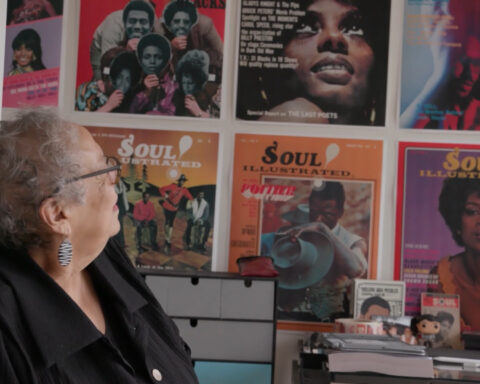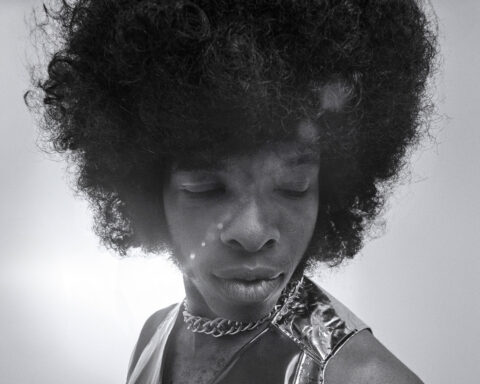Driving into Park City in a van with two high school girls from rural Mississippi, a veteran documentary filmmaker and an independent producer can be an enlightening experience. Obama is three days away from the inauguration ceremony and the girls—Chasidy and Jessica—are high school seniors, one black, one white, and have never been on a plane or outside of the Delta state. They are the subject of a documentary about the first integrated prom in Charleston High School, their small town of 2,000 two hours north of Jackson, Mississippi. It also helps that this isn’t only my first journey to Sundance, but a family road trip.
The documentary is Prom Night in Mississippi, born out of a return trip to Mississippi by my father, Paul Saltzman. He sits beside me in the van, excited and nervous—it’s his feature directorial debut and his first film in 15 years. The film is due to premiere the next evening at the Holiday Village Cinemas. In 1965, Paul had worked in the South with the Student Non-Violent Coordinating Committee (SNCC) on voter registration during the heat of the civil rights movement. Growing up, I remember him showing me a photo of a little girl in Greenwood standing behind the screen door of her shotgun house, the bullet holes in the screen showing the way into an even darker side of American history.
While researching a potential documentary on his time in the South, Paul met a local woman working in production, Thabi Moyo, who told him about Charleston High and their ongoing tradition of holding two proms—a black one and a white one. They even had separate homecoming Queens. From there, an idea for a completely new documentary grew.
Outside, the stark snow-covered hills of Utah roll past between Salt Lake and Park City. The landscape is low-lying houses and big sky, and there’s no question that it’s conjuring up all my romantic images of the State: Big Love, Alissa York’s Effigy. We arrive at five in the afternoon, as the last of the snowboarders pack up their gear and head to Main Street.
I don’t know what I expected. Something quite lavish, I’m sure. But first impressions of Sundance hark back to Redford’s 2007 message to the industry and the festival’s organizers ‘Focus on Film’ and flashy sponsors are noticeably absent. It’s quiet, and I like that. Without any tickets, I plan to wake up at eight and take my chances at the box office.
At 7:30 am Paul is already on his way to interviews. I remember when he would call me from the small cabin he, his wife Patricia, and Thabi had rented outside of Charleston during the four-month shoot. “I’m not sure where it’s going,” he said. “Some of the kids refuse to be interviewed, especially the parents who organize the white prom.”
The story was a constant excavation, laborious with brief glimpses of gold. Slowly it became clear that the kids really wanted to speak about the divisions of race within their own little microcosm, and their excitement when Morgan Freeman offered to pay for the prom if it was integrated.
When footage started to come back to Toronto, I saw a seventeen-year-old blonde look straight into the camera and say, “I don’t know,” when asked why she never invited any of her black girlfriends home. It’s Jessica, who is staying in the rented condo next to ours, who is the boldest in talking about how her father threatened to kill her if he ever caught her with a “N–gger.” The film is dark but at the same time incredibly life-affirming. It’s the students’ voices which echo Obama’s message of hope, beaming off the television in the lobby of The Yarrow.
At 8:00 am there’s already a line snaking through the Sundance box office. I get tickets for El General, a Mexican documentary by Natalia Almada, the great-granddaughter of Mexican president Plutarco Elias Calles. As I exit the box office, a friend calls to tell me he has a ticket for Sin Nombre, the much-talked about feature debut by Cary Joji Fukunaga. With a day before the premiere of Prom Night in Mississippi, I want to imbibe this too-short experience.
Outside it’s warm and clear with a deep blue sky. A distributor from New York tells me it’s the warmest it’s been in years. I never knew the city ran a series of free shuttle buses between the festival’s eight main venues. Each venue has a volunteer and a heat lamp. From Main Street, it is ten minutes to the venue for El General, which turns out to be a reform synagogue on the outskirts of Park City transformed into the most beautiful of screening rooms.
The route map says Temple. Where else can a temple be a cinema? Inside the main space, it’s serene and elegant, the walls hung with black cloth. The lights go down and the trailer attached to the film begins. It’s the 25th anniversary of the Sundance Film Festival, and the trailer shows a fantastically rendered clock-mechanism: a Rolodex of stills from the best of Sundance — Sex Lies and Videotape, Napoleon Dynamite and other indies.
The film starts. El General is a lyrical gathering of memories, pieced together from vintage footage of the President’s 1924 win in Mexico City, the director’s grandmother’s voiceover about her relationship with him and contemporary footage of Mexico City during the Obregon-Calderon election. It’s a documentary of historical impressions, beautiful and strangely nonpolitical for a film about a controversial former revolutionary who became President. After the lights come up, the audience rolls towards the exit. Waiting for the bus, I overhear a woman fuming to her husband about El General, “It’s like making a film about Pinochet and only talking about his love life.”
On the way to the next theatre, I call Paul. They’re in the festival centre at the Marriott. The girls are going to have their hair and makeup done before the premiere, and there’s word that CNN might be interested in doing a segment on Prom Night in Mississippi. I remember when he dropped off a rough cut of the film to my house and I watched it alone one cold night in December. The film opened with Charleston high-schoolers filming themselves with student cameras in their houses, their bedrooms, and their trailers. Faces, both black and white, letting us into their homes and lives and biases. I can’t wait to see the reaction at the premiere, the film’s first public screening.
The bus arrives at Eccles, the largest venue in the festival and the screening space for Sin Nombre. I’m probably the only one in this audience who has no idea what I’m about to watch. The crowd is at least a thousand thick, and one can feel the buzz bouncing off the theatre walls long before Cary Joji Fukunaga makes his appearance. I turn to my friend and shrug my shoulders, puzzled. When Fukunaga does walk on stage the crowd goes wild. I’ve never seen anything like it. Sin Nombre, produced in part by Gael Garcia Bernal and Diego Luna and already acquired for distribution by Focus Features, is the classic bordercrossing tale from Mexico to the United States, with an incredibly fascinating angle that one of the protagonists is a member of La Mara, the street gang with soldiers from Oaxca to L.A.
Fukunaga begins to speak when the crowd quiets down. He’s got to be thirty, wearing skinny jeans, a plaid shirt and thickframed glasses. He’s part Japanese, part white and speaks Spanish fluently. I realize what we’re watching is the Sundance star machine at work. Fukunaga is being thrust into the Sundance spotlight, joining the likes of Juno’s Jason Reitman and Napoleon Dynamite’s Jared Hess. But when the lights go down, one quickly realizes there’s nothing quirky about Sin Nombre. The film opens with Casper (Edgar Flores), a member of La Mara, staring at wallpaper showing an autumn day he will never see in Tapachula, Mexico. Then it shows him initiating a young gang member by beating him senseless. Brutality leads to brutality until Casper has to flee north. On that journey he meets Sayra (Paulina Gaitan). Their train journey is visceral, engrossing and an incredible mix of 21st century immigration and heart-stopping action. I don’t think I’ve ever seen a film quite like it. I end up feeling lucky that I caught something before it enters the wider world.
Outside, the sky has begun to darken behind the slopes. A mass of people move toward the shuttle waiting stations. It’s six pm and Prom Night in Mississippi premieres at eight-thirty. The Holiday Village Cinemas are behind the Yarrow Hotel and the cast and crew have arranged to meet in a Chinese restaurant next to the theatre. When I arrive, two full tables are crowded with the team. Jessica and Chasidy are all made up, the film’s editors, Kevin Schjerning and Steve Philipson, and a representative from the Mississippi Film Office are chatting over chow mein, and my dad sits on the other side of the table.
Paul looks good. Comfortable. When I sit down beside him, he smiles. It’s been a long journey to get here, from the chance inception of the story, through four months of gaining trust in a small town high school, to the incredibly difficult task of talking to young people about their own biases and forms of racism in the 21st century. But here we are, all eating Chinese food before the premiere.
At eight, a Sundance coordinator ushers us out of the restaurant and into a small white VIP tent set up across from the theatre. Outside, the air is cold and a long line of people wait to get in. The film is sold out and people are asking anyone if they have extra tickets for sale. Paul, Patricia and the girls do a quick series of photo-ops and then we head into the theatre. The room is full. I sit down towards the front and watch as Sundance documentary programmer David Courier stands up to introduce the film. He’s excited and proud, and I begin to feel equal pride for my father. To build something and see it through is never an easy thing, even if it’s presented in a temple, a large concert hall or the Egyptian. Paul briefly talks about the film and says he hopes everyone enjoys it. Prom Night in Mississippi begins.
I’m again taken through the lead up to Charleston High School’s first integrated prom. The high school seniors’ faces and words radiate from the screen. During a student council meeting about the upcoming integrated prom, a school board trustee says he’s worried about violence, and is reassured that there will be armed security on that night.
In the sea of black and white faces passing each other in the halls, two young people stand out as the only mixed couple. Jeremy and Heather hold hands and talk about their love. In a separate interview Heather’s father says how he hopes they will drift apart. The songs of Kanye West and Feist float through the background.
It is indeed a powerful, life-affirming film. At the end the audience moves into prolonged clapping. The next morning, CNN does a segment on Prom Night in Mississippi in honour of Martin Luther King Day and one day later, January 20th, Obama’s inauguration is projected on a large screen at the top of Main Street. During the 25th anniversary of the Sundance Film Festival politics becomes film and film becomes politics.











